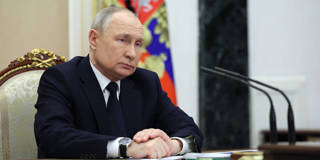While Wagner Group leader Yevgeny Prigozhin abandoned his march on Moscow, his aborted rebellion has exposed the institutional decay of President Vladimir Putin’s corrupt regime. Despite Putin’s lofty visions of imperial grandeur, his reliance on mercenaries has exposed his “empire” as dysfunctional and nearly ungovernable.
TEL AVIV – Some military coups purport to represent the vanguard of modernization and change. Others, such as Chile’s in 1973 and Spain’s failed attempt in 1981, are fueled by nostalgia for past dictatorships. The majority of coups are at least partly driven by powerful group grievances.
Russian warlord Yevgeny Prigozhin’s aborted quasi-coup, by contrast, seems to have been motivated solely by his personal quest for power and prestige. And while Prigozhin and his Wagner Group mercenaries quickly abandoned their march on Moscow, they exposed the institutional decay of Russian President Vladimir Putin’s praetorian regime.
Prigozhin thus demonstrated that he is less a threat to Putin’s rule than he is a symptom of its inherent fragility. Essentially, he is a Putin loyalist who developed, as the Russian president put it, “exorbitant ambition and personal interest.” With his rising popularity threatening to undermine Putin’s monopoly on the country’s attention, Prigozhin simply became too powerful to be left unchecked.

TEL AVIV – Some military coups purport to represent the vanguard of modernization and change. Others, such as Chile’s in 1973 and Spain’s failed attempt in 1981, are fueled by nostalgia for past dictatorships. The majority of coups are at least partly driven by powerful group grievances.
Russian warlord Yevgeny Prigozhin’s aborted quasi-coup, by contrast, seems to have been motivated solely by his personal quest for power and prestige. And while Prigozhin and his Wagner Group mercenaries quickly abandoned their march on Moscow, they exposed the institutional decay of Russian President Vladimir Putin’s praetorian regime.
Prigozhin thus demonstrated that he is less a threat to Putin’s rule than he is a symptom of its inherent fragility. Essentially, he is a Putin loyalist who developed, as the Russian president put it, “exorbitant ambition and personal interest.” With his rising popularity threatening to undermine Putin’s monopoly on the country’s attention, Prigozhin simply became too powerful to be left unchecked.